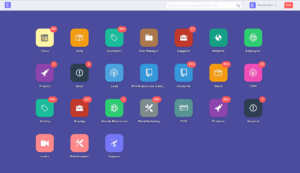ERPNext
 | |
|
Desk of ERPNext version 7 | |
| Original author(s) | Rushabh Mehta |
|---|---|
| Developer(s) | Frappé Technologies Pvt. Ltd. and Community |
| Initial release | 2008 |
| Stable release |
7.0.62
/ 19 October 2016[1] |
| Preview release |
7.1.0 beta
/ 22 October 2016[2] |
| Development status | Active |
| Written in | Python and JavaScript |
| Type | ERP, CRM, Accounting |
| License | GNU GPLv3 |
| Website |
erpnext |
ERPNext is a free and open-source integrated Enterprise Resource Planning (ERP) software developed by Frappé Technologies Pvt. Ltd. and is built on MariaDB database system using a Python based server-side framework.
ERPNext is an alternative to NetSuite and QAD, and similar in function to Odoo (formerly OpenERP), Tryton and Openbravo.
Industry solutions
ERPNext contains these modules:
- Accounting
- Asset management
- Customer relationship management CRM
- Human resource management HRM
- Manufacturing
- Point of sale POS
- Project management
- Purchasing
- Sales management
- Warehouse management system
Software license
ERPNext is released under the GNU GPLv3 license. Consequently, ERPNext does not require license fees as opposed to proprietary ERP vendors. In addition, as long as the terms of the licenses are adhered to, modification of the program is possible. [3]
Architecture
ERPNext has a Model-View-Controller architecture with metadata modeling tools that add flexibility for users to adapt the software to unique purposes without the need for programming. Some attributes of the architecture are:
- All objects in the ERP are DocTypes (not to be confused with HTML DocTypes) and the Views are generated directly in the browser.
- Client interacts with the server via JSON data objects on a Representational state transfer (RESTful) supporting server.
- There is ability to plug-in (event driven) code on the client and server side.
The underlying web app framework is called "Frappé" [4] and is maintained as a separate open source project. Frappé started as a web based metadata framework inspired from Protégé[5] though it has evolved differently.
This architecture allows rapid application development (RAD).
Source Code and Documentation
The source code of ERPNext is hosted on GitHub,[6] using the Git revision control system, and the contributions are also handled using GitHub.
A complete user manual is available at the project website.[7]
Innovations
The primary innovation of ERPNext has been in the metadata modeling architecture which provides for flexible use of the application without custom programming. [8]
The user interface incorporates usability enhancements designed to improve ease of use and user productivity.

Software As A Service
ERPNext is available as a Software as a service in addition to user-hosting.[9]
Reporting
ERPNext provides an embedded reporting system with office suite integration. Report customization is available within ERPNext. [10]
References
External links
- Market research, Megaventory.
- ERPNext, Panorama Consulting.
- Install ERPNext on FreeBSD, dalescott.net.
- Install ERPNext on Debian Squeeze, Computer King.
- Installation of ERPNext on UBUNTU, Aditya Duggal's Blog.
- Four short links, Oreilly.
- New Accounting Application, ReadWriteCloud.
